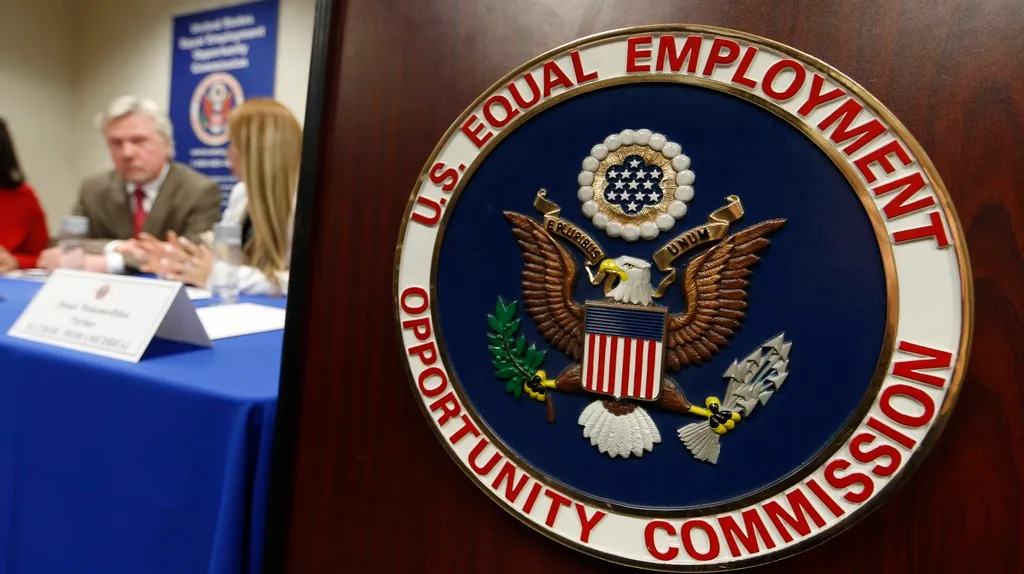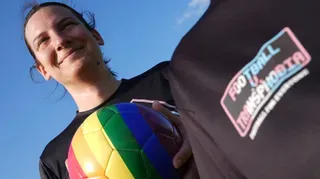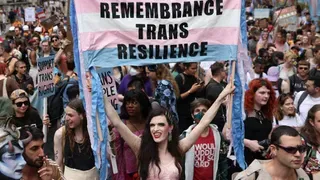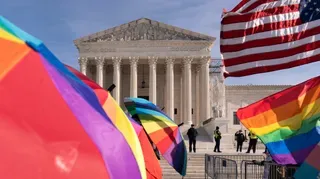February 23, 2011
From Grammy to Slammer :: Anti-Gay Singer Buju Banton Convicted, Faces 15 Years-Life
Kilian Melloy READ TIME: 8 MIN.
Jamaican singer Buju Banton has outraged gays with so-called "murder music", found vindication from the Grammy awards, and now, after a second trial in connection with allegations that he was involved in a cocaine purchase from undercover law enforcement officers, been found guilty on drugs charges.
The guilty verdict was reached by jurors in a Florida courtroom on Feb. 22, according to an Associated Press article published that same day.
A Feb. 23 article in Kingston, Jamaica-based newspaper the Gleaner noted that Banton's earlier trial, in September, 2010, failed to reach a verdict.
"Buju has been found guilty of conspiracy to possess with intent to distribute five kilograms or more of a mixture and substance containing a detectable amount of cocaine, knowingly and intentionally possessing a firearm in furtherance of and during the course of a drug-trafficking crime, and aiding and abetting others in using a communication facility in the commission of a felony," the Gleaner article reported.
Banton was found not guilty of a further charge relating to possession of cocaine, the article said.
"We are all very upset and disappointed and emotional," Banton's lawyer, David Oscar Markus, told the press. "The only person who seems to be OK is Buju. We just saw him in the lock-up and he told us that he was happy that he fought, knowing that he is innocent."
Banton, whose real name is Mark Myrie, is known in the GLBT community for his song "Boom Bye Bye," which describes killing gay men and setting fire to their bodies. The song, an early hit for Banton, has propelled protests and boycotts in the United States. In 2009, a Banton concert tour in the U.S., the "Rasta Got Soul" tour, was impacted by protests from GLBT equality organizations, leading to the cancellation of some performances, and changes of venue for others.
The song's lyrics, as rendered into American standard English, declare:
"Get an automatic or an Uzi instead
Shoot them now
When Buju Banton arrives
Faggots have to run
Or get a bullet in the head
Bang-bang in a faggot's head
Homeboys don't condone nasty men
They must die."
PR efforts at the time were directed at countering the protests and media attention that the song had generated. A release issued by Banton's label, Gargamel Music, referenced a desire to correct what it called "the grossly inaccurate portrait of Buju being painted by certain organizations and systematically relayed to the masses and the media."
Explained the release, "Buju Banton was all of 15 years old when he wrote 'Boom Bye Bye' in response to widely publicized man/boy rape case in Jamaica. It was not a call to violence." The release added, "The song was released on a popular dancehall rhythm in 1992 and caused a huge uproar after receiving commercial radio play in the States.
"Following much public debate back then, prominent gay rights leaders and Buju decidedly moved on," continued the release. "For the record, it is the only song he ever made on the subject--and he does not perform it today."
GLBT rights organizations were not convinced, citing Banton's allegedly having signed on to a pact against violence and then distanced himself from that agreement. Banton reportedly continued to perform the song, which has allegedly been sung by anti-gay mobs in his home country.
Jamaica has earned a reputation for being one of the most homophobic nations in the world. The country's overall murder rate is one of the world's highest, and gay men are frequent targets. Anti-gay violence in Jamaica has drawn headlines in recent years, with gangs breaking into houses to attack gay men. Banton himself reportedly faced charges in connection with just such a housebreaking and assault.
Banton's music was also connected with reported acts of anti-gay violence. A Sept. 13, 2009, press release from the Gay Liberation Network noted, "When Jamaica's leading gay rights activist, Brian Williamson, was murdered in an apparent hate crime murdered in 2004, a Human Rights Watch researcher who went to the murder scene reported that a mob had gathered and was celebrating the murder by chanting the chorus to 'Boom Bye Bye.' "
Activism opposing Jamaican "murder music" advocating violence against gays "was initiated in the early 1990s by British gay activist Peter Tatchell and Jamaica's leading LGBT group, Jamaica Forum of Lesbians, All-Sexuals and Gays (J-FLAG)," the release added.
An Aug. 28, 2009 news release from the L.A. Gay & Lesbian Center publicized the cancellations of Banton concert dates in Los Angeles, San Francisco, Chicago, Las Vegas, Philadelphia, Dallas, and Houston. The Center's chief executive, Lorri L. Jean, was quoted in the release as saying, "I hope this victory sends a deafeningly loud message to other promoters and concert venues, that singers who glorify violence against LGBT people, or any group of people, should never be welcomed."
Added Jean, "It shouldn't be necessary for us to pressure promoters to do the right thing; people like Banton should never have been booked in the first place."
The release asserted that, "Through his music, Banton promotes a culture of violence against lesbian, gay, bisexual and transgender (LGBT) people, singing in his most notorious song 'Boom, Bye Bye that 'faggots get up and run' when he comes, that 'they have to die,' and that he will shoot them in the head or 'burn them up bad.'
Noted Jean, "In his home country of Jamaica, Banton and his fellow performers of 'murder music,' have helped to create and sustain a culture in which violence against LGBT people is not only tolerated, it's sometimes celebrated."
The Music and the Culture of a Homophobic Land
Indeed, a Sept. 2, 2009 EDGE article noted the pervasive homophobia in Jamaican society and musical culture, reporting on how gay men have been targeted for mob violence, including fire bombings, while lesbians live in fear of being subjected to similar mistreatment and even so-called "corrective rape" at the hands of men seeking to "cure" them through forced sexual contact.
But the article also warned that systematic boycotts and pressure against promoters to cancel anti-gay reggae artists might backfire, deepening what some consider to be a schism between gays and African Americans, who are seen as voting against GLBT equality--for example, in the revocation of the rights of gay and lesbian families in California in 2008, when Proposition 8 passed narrowly at the ballot box with support from many African American churches and religious leaders. Anti-gay advertising during the deeply divisive Proposition 8 campaign claimed that unless marriage equality were eradicated in California, people of faith would see their freedoms of religion and free expression eroded.
But in the L.A. Gay & Lesbian Center release, Jean drew a distinction between free speech and advocating violence and killing. "The Center is an ardent supporter of free speech and artistic expression," said Jean, "but we cannot--and will not--tolerate speech in any form that promotes violence against LGBT people."
The release went on to cite earlier examples of anti-gay music being countered by pressure from GLBT groups. "In 2004 the House of Blues responded to pressure from the Center and the LGBT community, eventually canceling a concert at its West Hollywood venue by Capleton, a reggae singer who also promoted violence against gay people," the release noted. "And just a year later, the company eventually agreed to cancel a West Hollywood concert by Sizzla, a performer who sang lyrics that included: 'I go and shoot queers.' "
In the midst of the 2009 protests, Banton met with GLBT equality advocates. An Oct. 17, 2009 blog posting at The Petrelis Files reported that four San Francisco-area GLBTs met with Banton during a 40-minute sit-down that Banton's people said was the first face-to-face conversation the singer had engaged in with gays.
Petrelis reported that the Banton camp expressed a desire to end the acrimony between Banton and protesters, and noted that he, San Francisco Gay Community Center executive director Rebecca Rolfe, Equality California's Andrea Shorter, and San Francisco city Supervisor Bevan Dufty were in attendance, as was heterosexual city Supervisor Eric Mar, music company president Tracii McGregor, and Banton himself.
Petrelis described the meeting as "very civil and productive," even though the suggestions offered to Banton for repairing relations with the GLBT community--such as donating money to GLBT Jamaican group JFLAG, or performing a song about gays with a positive message--were turned down.
Meanwhile, Banton's supporters in Jamaica blamed the gay community for the tour's difficulties, with one newspaper, the Jamaica Observer, referring to GLBT advocacy groups as "strong arm thugs from the gay community."
Later that year, Banton was nominated for a Grammy Award for his album Reggae Got Soul. GLBT equality advocates condemned the nod, with The L.A. Gay & Lesbian Center issuing a statement denouncing the nomination.
"We're shocked that Buju Banton, a singer with a long record of performing a song that glorifies the murder of gay people, would be honored with a Grammy nomination, regardless of the artistic merit of any of his work," said Jim Key, the Center's Chief Public Affairs Officer.
"He is completely unrepentant," the release continued, noting that Banton "refuses to stop performing the song, and recently said, 'There is no end to the war between me and faggots.' " Added the release, "It's an affront to LGBT people, and to all fair-minded people around the world, that Buju Banton was even nominated," the Center's statement read. "We certainly hope the members of the Recording Academy will not bestow the prestigious honor of a Grammy on someone whose music promotes murder."
It was only a week later that Banton was arrested in connection with the drug sting operation in Florida. The operation was carried out by the Drug Enforcement Agency (DEA) in Tampa. A Dec. 15, 2009 Associated Press article subsequently provided details.
"Banton contacted the confidential informant last Monday about a possible cocaine purchase," the article read. "The next day, Banton and other men met with the informant at Sarasota's La Tropicana de Havana restaurant, where the DEA and local police had set up surveillance."
The article went on, "Eventually, the group went to a warehouse authorities had outfitted with audio and video recording devices to make the cocaine deal. An undercover police officer pulled out one brick of the 20-kilogram load, according to the DEA, and one of Banton's associate's sliced it open with a knife.
"Banton, according to the affidavit, 'instantly wiped the blade of that knife with his finger and placed that finger in his mouth in what appeared to be an attempt to taste the cocaine.' After two more meetings at local restaurants between the informant and Banton's associates, authorities arrested the associates and then took Banton into custody... in Miami."
Banton addressed the specifics in the affidavit's account, reported the Gleaner article, telling the court that "he was 'stupid' to have said the things he did and even to have tasted the cocaine in the warehouse." Recordings of Banton speaking with an informant, Alexander Johnson, captured the reggae star claiming to be involved with a drug trafficking operation, but Banton told the court that he had been "just talking," and that his boasts were empty. "I talk too much, but I am not a drug dealer," Banton said, a Feb. 15 AP article reported.
"In excerpts from their recorded conversations from July 2009 through December 2009 that were played for the jury, the husky-voiced singer told Johnson that he financed drug deals and that he wanted to sell drugs in Europe, buy drugs from the Caribbean and South America, and use Johnson's boat to transport drugs," the AP article reported.
When Banton was placed under arrest, supporters in Jamaica decried the GLBT community once again, going so far as to suggest that American gays had orchestrated a set-up to bring him down.
Banton remained in prison for nearly a year. Stephen Marley, son of reggae icon Bob Marley, paid Banton's bond in November of 2010, the AP story said. Banton performed at a concert to raise revenue for his defense, and guided the completion of his new album, Before the Dawn, via phone. The album had mostly been produced prior to Banton's arrest. Before the Dawn won a Grammy Award last week.
Banton could face a jail sentence of anywhere between 15 years and life, media reports said.
Kilian Melloy serves as EDGE Media Network's Associate Arts Editor and Staff Contributor. His professional memberships include the National Lesbian & Gay Journalists Association, the Boston Online Film Critics Association, The Gay and Lesbian Entertainment Critics Association, and the Boston Theater Critics Association's Elliot Norton Awards Committee.






